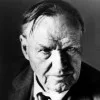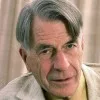Once a man’s understanding has settled on something (either because it is an accepted belief or because it pleases him), it draws everything else also to support and agree with it. And if it encounters a larger number of more powerful countervailing examples, it either fails to notice them, or disregards them, or makes fine distinctions to dismiss and reject them, and all of this with much dangerous prejudice, to preserve the authority of its first conceptions.
[Intellectus humanus in iis quae semel placuerunt (aut quia recepta sunt et credita, aut quia delectant), alia etiam omnia trahit ad suffragationem et consensum cum illis: et licet major sit instantiarum vis et copia, quae occurrunt in contrarium; tamen eas aut non observat, aut contemnit, aut distinguendo summovet et rejicit, non sine magno et pernicioso praejudicio, quo prioribus illis syllepsibus authoritas maneat inviolata.]
Francis Bacon (1561-1626) English philosopher, scientist, author, statesman
Instauratio Magna [The Great Instauration], Part 2 “Novum Organum [The New Organon],” Book 1, Aphorism # 46 (1620) [tr. Silverthorne (2000)]
(Source)
(Source (Latin)). Alternate translations:The human understanding, when any preposition has been once laid down, (either from general admission and belief, or from the pleasure it affords,) forces every thing else to add fresh support and confirmation; and although more cogent and abundant instances may exist to the contrary, yet either does not observe or despises them, or gets rid of and rejects them by some distinction, with violent and injurious prejudice, rather than sacrifice the authority of its first conclusions.
[tr. Wood (1831)]The human understanding when it has once adopted an opinion (either as being the received opinion or as being agreeable to itself) draws all things else to support and agree with it. And though there be a greater number and weight of instances to be found on the other side, yet these it either neglects and despises, or else by some distinction sets aside and rejects; in order that by this great and pernicious predetermination the authority of its former conclusions may remain inviolate.
[tr. Spedding (1858)]The human Intellect, in those things which have once pleased it (either because they are generally received and believed, or because they suit the taste), brings everything else to support and agree with them; and though the weight and number of contradictory instances be superior, still it either overlooks or despises them, or gets rid of them by creating distinctions, not without great and in jurious prejudice, that the authority of these previous conclusions may be maintained inviolate.
[tr. Johnson (1859)]Once a human intellect has adopted an opinion (either as something it likes or as something generally accepted), it draws everything else in to confirm and support it. Even if there are more and stronger instances against it than there are in its favour·, the intellect either overlooks these or treats them as negligible or does some line-drawing that lets it shift them out of the way and reject them. This involves a great and pernicious prejudgment by means of which the intellect’s former conclusions remain inviolate.
[tr. Bennett (2017)]
Quotations about:
dogmatism
Note not all quotations have been tagged, so Search may find additional quotes on this topic.
Profound ignorance makes a man dogmatical; he who knows nothing thinks he can teach others what he just now has learned himself.
[C’est la profonde ignorance qui inspire le ton dogmatique. Celui qui ne sait rien croit enseigner aux autres ce qu’il vient d’apprendre lui-même.]
Jean de La Bruyère (1645-1696) French essayist, moralist
The Characters [Les Caractères], ch. 5 “Of Society and Conversation [De la Société et de la Conversation],” § 76 (5.76) (1688) [tr. Van Laun (1885)]
(Source)
(Source (French)). Alternate translations:Profound Ignorance makes a Man dogmatick. If he knows nothing, he thinks he can teach others what he is to learn himself.
[Bullord ed. (1696)]Profound Ignorance makes a Man dogmatick; he who knows nothing, thinks he can teach others what he just now has learn'd himself.
[Curll ed. (1713)]A dogmatic tone is generally inspired by abysmal ignorance. The man who knows nothing thinks he is informing others of something which he has that moment learnt.
[tr. Stewart (1970)]
There were four things the Master abstained from entirely: he did not speculate, he did not claim or demand certainty, he was not inflexible, and he was not self-absorbed.
[子絕四、毋意、毋必、毋固、毋我]
Confucius (c. 551- c. 479 BC) Chinese philosopher, sage, politician [孔夫子 (Kǒng Fūzǐ, K'ung Fu-tzu, K'ung Fu Tse), 孔子 (Kǒngzǐ, Chungni), 孔丘 (Kǒng Qiū, K'ung Ch'iu)]
The Analects [論語, 论语, Lúnyǔ], Book 9, verse 4 (9.4) (6th C. BC – 3rd C. AD) [tr. Ames/Rosemont (1998)]
(Source)
Different versions of the Analects take these four items in slightly differing order, reflected in the translations below. (Source (Chinese)). Alternate translations:There were four things from which the Master was entirely free. He had no foregone conclusions, no arbitrary predeterminations, no obstinacy, and no egoism.
[tr. Legge (1861)]The Master barred four (words); - he would have no "shall"s, no "must"s, no "certainly"s, no "I"s.
[tr. Jennings (1895)]There were four things from which Confucius was entirely free : He was free from self-interest, from prepossessions, from bigotry and from egoism.
[tr. Ku Hung-Ming (1898)]The Master was entirely free from four things: he had no preconceptions, no pre-determinations, no obduracy, and no egoism.
[tr. Soothill (1910)]He was cut off from four things; he had no prejudices, no categoric imperatives, no obstinacy or no obstinate residues, no time-lags, no egotism.
[tr. Pound (1933); yes, that looks to be five things]There are four things that the Master wholly eschewed: he took nothing for granted, he was never over-positive, never obstinate, never egotistic.
[tr. Waley (1938)]The Master recognized four prohibitions; Do not be swayed by personal opinion; recognize no inescapable necessity; do not be stubborn; do not be egotistic.
[tr. Ware (1950)]He denounced (or tried to avoid completely) four things: arbitrariness of opinions, dogmatism, narrow-mindedness and egotism.
[tr. Lin Yutang (1938)]There were four things the Master refused to have anything to do with: he refused to entertain conjectures or insist on certainty; he refused to be inflexible or to be egotistical.
[tr. Lau (1979)]The Master cut out four things. He never took anything for granted, he never insisted on certainty, he was never inflexible and never egotistical.
[tr. Dawson (1993)]The Master absolutely eschewed four things: capriciousness, dogmatism, willfulness, self-importance.
[tr. Leys (1997)]The Master was absolutely free from four things: free from conjecture, free from arbitrariness, free from obstinacy, free from egoism.
[tr. Huang (1997)]Confucius prohibited the four points: no wantonness, no dictatorship, no stubbornness, and no arrogance.
[tr. Cai/Yu (1998)]The Master avoided four things: no wish, no will, no set, no self.
[tr. Brooks/Brooks (1998); they further interpret, "no fixed opinions, no foregone conclusions, no stubbornness, no self-absorption"]The Master had freed himself of four things: idle speculation, certainty, inflexibility, and conceit.
[tr. Hinton (1998)]The Master observed four prohibitions: no willfulness, no obstinacy, no narrow-mindedness, no egotism.
[tr. Watson (2007)]The Master stayed away from four things: he did not put forth theories or conjectures; he did not think he must be right; he was not obdurate; he was not self-centered.
[tr. Annping Chin (2014)]Confucius has four ultimate mindsets for perfect: no prejudice, no absolute must, no fixation, no self.
[tr. Li (2020)]
They clung to their rock-bottom opinions. They were so strong in their beliefs that there came a time when it hardly mattered what exactly those beliefs were; they all fused into a single stubbornness.
I am often inclined to be envious of other people’s religion. They are so cocksure dogmatically that they act as though they are omniscient. Life has no doubts, its direction is determined, all evil is by hypothesis overruled by an all-wise God for good. I do not share this view of life, any more than I share the Christian Science views of disease, but I can see that it makes people enthusiastic, effective, self-forgetful and often fanatical and great bores.
Henry Joel Cadbury (1883-1974) American biblical scholar, Quaker historian, writer, activist
“My Personal Religion,” lecture, Harvard School of Divinity (1936)
(Source)
It is the dull man who is always sure, and the sure man who is always dull.
H. L. Mencken (1880-1956) American writer and journalist [Henry Lewis Mencken]
“The National Letters,” Prejudices: Second Series (1920)
(Source)
For at least two thirds of our miseries spring from human stupidity, human malice, and those great motivators and justifiers of malice and stupidity, idealism, dogmatism, and proselytizing zeal on behalf of religious or political idols.
Aldous Huxley (1894-1963) English novelist, essayist and critic
“Knowledge and Understanding,” Vedanta and the West (May-Jun 1956)
(Source)
Revision of a 1955 lecture given at the Vedanta Society of Southern California; this phrase, however, does not occur in it (the surrounding text is found around the 10:00 mark). Reprinted in Adonis and the Alphabet, and Other Essays (in the US Tomorrow and Tomorrow and Tomorrow, and Other Essays) (1956).
Not to be absolutely certain is, I think, one of the essential things in rationality.
Bertrand Russell (1872-1970) English mathematician and philosopher
“Am I an Atheist or an Agnostic?” sec. “Don’t Be Too Certain!” (1949)
(Source)
Originally given as a speech, "Agnosticism v. Atheism," Rationalist Press Assoc. Annual Dinner, London (1949-05-20), then printed as "Agnosticism v. Atheism," The Literary Guide and Rationalist Review (1949-07), then released as an essay under this title later in 1949.
Moral certainty is always a sign of cultural inferiority. The more uncivilized a man, the surer he is that he knows precisely what is right and what is wrong. All human progress, even in morals, has been the work of men who have doubted the current moral values, not of men who have whooped them up and tried to enforce them. The truly civilized man is always skeptical and tolerant in this field as in all others. His culture is based on “I am not too sure.”
H. L. Mencken (1880-1956) American writer and journalist [Henry Lewis Mencken]
Minority Report : H.L. Mencken’s Notebooks, #418 (1956)
(Source)
Doubt is not a pleasant condition, but certainty is an absurd one.
[Le doute n’est pas une condition agréable, mais la certitude est absurde.]
Voltaire (1694-1778) French writer [pseud. of Francois-Marie Arouet]
Letter to Frederick William, Prince of Prussia (28 Nov 1770) [tr. Tallentyre (1919)]
(Source)
Alt trans.
- "Doubt is not a pleasant condition, but certainty is absurd."
- "Doubt is not an agreeable condition, but certainty is an absurd one."
- "Doubt is not a very agreeable state, but certainty is a ridiculous one."
The causes of the Great Depression are still far from certain. A lack of certainty, it may also be observed, is not evident in the contemporary writing on the subject. Much of it tells what went wrong and why with marked firmness. However, this paradoxically can itself be an indication of uncertainty. When people are least sure they are often most dogmatic.
John Kenneth Galbraith (1908-2006) Canadian-American economist, diplomat, author
The Great Crash, 1929, ch. 9 “Cause and Consequence,” sec. 3 (1954)
(Source)
















